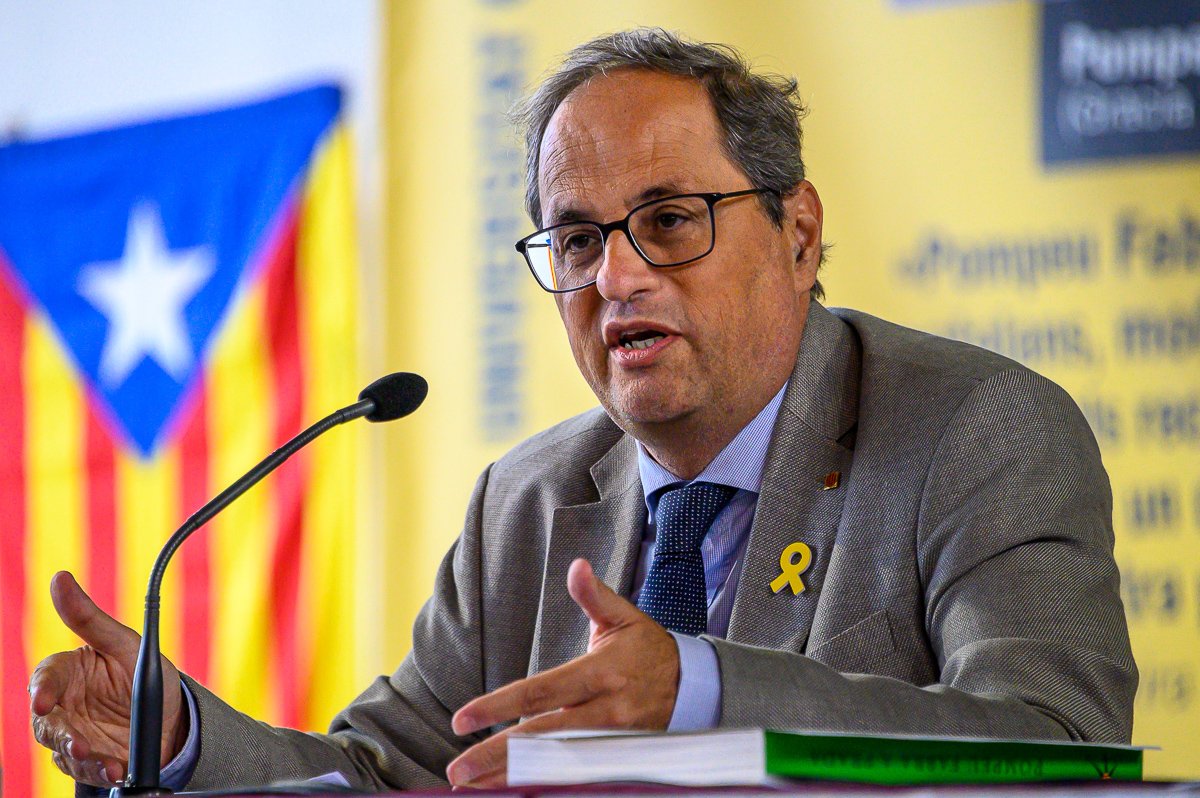With bluntness and a good helping of self-criticism, Catalan president Quim Torra has today restarted the political year after the holidays during the Catalan Summer University current underway in France. From Prada, a town in French Catalonia (Prades in French), Torra called for this year's Diada (Catalan national day) on 11th September to mark the "starting signal" of the "final stretch of the [independence] process". He warned that this will require "sacrifices" and "risks", but argued that "all that's left is peaceful confrontation" and the "democratic rupture" to move ahead with independence.
The president criticised the "contempt" from acting Spanish prime minister Pedro Sánchez towards the pro-independence Catalan parties and that he made no reference to the Catalan crisis in the debate on investing him as prime minister in July. Torra said that this is the reason why his party wanted to amend the budget and voted against his investiture, and warned that they will do it again if there's no proposal for Catalonia. A position which contradicts what their government partners, ERC, say.
Next steps
In the heart of the debate within the pro-independence movement on what steps to take over the coming months, and waiting for the sentence in the trial following the 2017 independence push, the president admitted that the independence movement has not been "capable of moving forwards towards the objective". As such, he called for a new phase to start including them recovering the initiative and rebuilding trust. At this point, he also called for an end to "partisan" infighting and the "battles between independence supporters", a return to the spirit of unity and coming together to "rebuild the path".
"I ask for us to get going again. We have the responsibility to do it again. We cannot remain paralysed trying to manage asphyxiated powers as an autonomous community", he said in response to the criticism from certain sectors of the pro-independence movement which accuse the government of returning to the model of autonomous communities.
As such, Torra said that his aim isn't to "manage an autonomous community" and that he will always be on the side "of those who see the 1st October [2017 referendum] as the founding moment of the Catalan Republic". "No one should count on me to turn the 1st October into a melancholy memory," he said. He also committed to restoring Carles Puigdemont as president of Catalonia.
Response to the verdict
What he didn't clarify, however, is what his government's response will be to the upcoming verdicts in the referendum trial. He said attendees should listen to the speech he will give on 5th September in Madrid, which will be the "second half" of his remarks today in Prades. He did claim that his proposal will be "unequivocal, coherent and firm", that it will involve "all actors and spaces" and that it will mark a "before and an after".
Torra expressed support for not waiting for the verdicts and moving already from a "defensive strategy" to "initiative". He noted that independence is "never a gift", but a "conquest" and suggested a move to civil disobedience. Recalling the spirit of the 2017 referendum, he insisted "we'll do it again as many times as necessary".
During the speech, which lasted about forty-five minutes, the head of the Catalan executive avoided talking about the possibility of an early election, putting the focus instead on passing a new budget which would "drive the republic", in harmony with CUP. The president's words in Prades come the day after the president of ERC, imprisoned former vice-president Oriol Junqueras, argued in an interview with Catalunya Ràdio that the option of calling an election in response to the verdict shouldn't be dismissed. Torra met with the prisoners in Lledoners this Monday for over five hours, but no details of the conversation have emerged.

